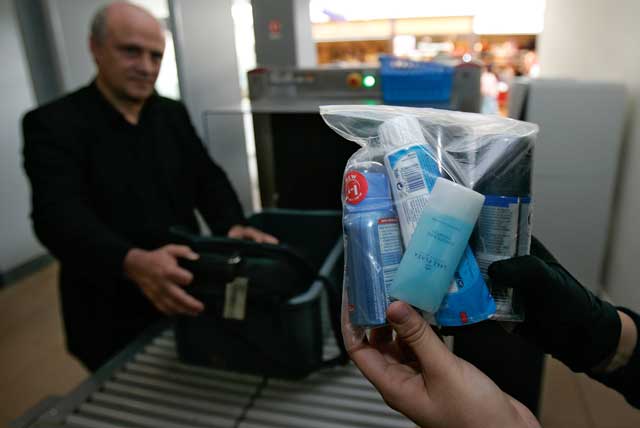Simon Calder: New rules on liquids need solid foundations
The man who pays his way

Bringing home tequila from Mexico has always struck me as a questionable pursuit: not just because of the health impact of drinking distilled agave in any quantity, but also because carrying large bottles of flammable liquids half-way across the world has never made sense to me. So when, nearly five years ago, the "liquids ban" came into effect because of a terrorist plot involving bomb ingredients concealed in drinks containers, the one beneficial side-effect was to reduce the volume of spirits that were flown around the world.
However, duty-free vendors from Singapore to Mexico City are rejoicing at the news that, from the end of this month, travellers will be able to buy before they fly to EU airports such as Heathrow and Amsterdam, even if they then transfer to another flight. At present, any duty free is confiscated at the security check for the connecting flight.
But before you buy a three-pack of champagne to celebrate, beware: not only must the drink be contained in a transparent, tamper-proof bag, but the security staff also reserve the right to open any bottles to check that the contents are as described on the label. That presents little problem for a bottle of tequila, but could take the sparkle out of your trip if it's Moët & Chandon.
A more significant worry is that anything that could confuse matters is the last thing that hard-pressed security staff need. From past experience, passengers will misinterpret the easing of rules, and get all kinds of wrong ideas – trying to take wine bought outside the airport on to an intra-European flight, or buying booze en route to the US with a connection in, say, Houston. My understanding is that this will continue to be forbidden.
Last week, I wrote here about the problems with liquids at the Stansted security checkpoint, which resulted in cabin baggage being abandoned and flights being missed. Mark Davison, the head of media relations at the Essex airport, has responded with a courteous letter that helps explain things: "Your report highlights an issue that is really key to ensuring that passengers travel through the security search area as quickly and easily as possible – preparing correctly before they leave for the airport. Despite the current security rules being in place for nearly five years, we take every opportunity to bang home this message as it is so crucial."
He makes a good point: the rules on "LAGs" (liquids, aerosols and gels) are clear, but plenty of travellers choose to ignore them. And a lot of the time that is because the rules are enforced with so little enthusiasm elsewhere. At Amsterdam airport, for example, liquids can happily stay inside bags rather than being presented separately, as in the UK. And as every laptop user will know, the rule on whether or not to take the computer out of the bag seems to change from day to day.
I have no particular problem with inconsistencies, because if rules are followed blindly then disaster may ensue: the 9/11 terrorists were legally admitted to the US, and the blades they carried on their murderous final journeys were permitted on board aircraft. But I can guarantee that a change in rules which will benefit only a tiny percentage of travellers will lead to more confusion, make queues even longer and distress even more passengers.
Belt-and-braces approach to avoiding security delays
The best way to avoid being delayed at security? Well, you could walk through naked, but the next best thing is to check in anything from LAGs to Lego, rather than risk your cabin baggage being selected for extra scrutiny. While some airlines – notably British Airways and other "legacy" carriers – continue to offer a free baggage allowance, this could make sense even if you would normally travel only with hand luggage.
But Adrian Young, a safety manager at a European airline, warns that this leads to another risk: that your bag does not turn up at the other end. "A trip in February, from Amsterdam to Torp in Norway, went wrong because KLM staff took a whole trolley of bags to the transfer hall instead of the plane," he says. "Thereby 18 bags, on a plane with only 70 seats, were not delivered until the next day. Not a good start to a skiing holiday."
Nevertheless, Mr Young still sees the value of checking in bags to speed up security checks: "If you have any faith in the combination of airline/airport you are using, check everything in – even your belt". Just hope it turns up on the baggage belt.
Join our commenting forum
Join thought-provoking conversations, follow other Independent readers and see their replies
Comments
Bookmark popover
Removed from bookmarks